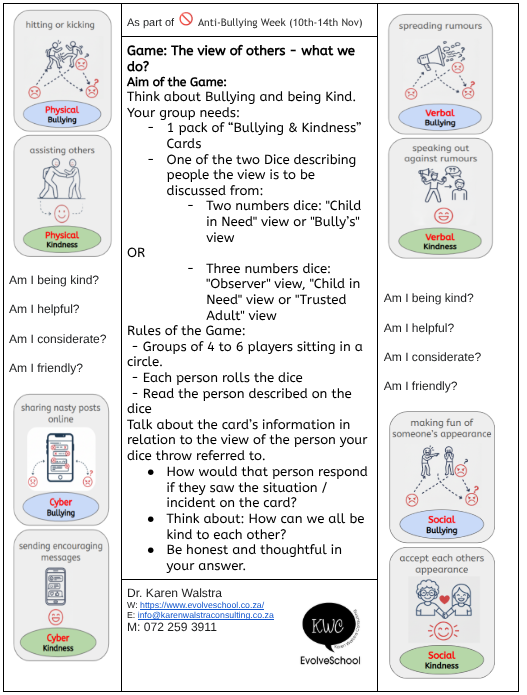You Have the Power to Be Kind! Anti-Bullying!
- Karen Walstra

- Nov 11, 2025
- 3 min read
Updated: Feb 9

Did you know it is Anti-Bullying Week (10th-14th Nov)?
Bullying is never okay. It's a mean, repeated action where one person or group tries to hurt or control another. But here's the powerful truth: You have the power to stand up to bullying, be a great support, and make your school and community a kinder, safer place!
Become an Upstander and a powerful digital citizen.
At the end of the post are three "Bullying vs Kindness Games" to order, play and discuss with your learners or with your children at home. Let me know if you would like to order a game kit.
1. Know the Different Types of Bullying
Bullying isn't just one thing—it can be physical, verbal, social, or cyber. Knowing what to look for is the first step to stopping it.

Physical Bullying:
Hitting, kicking, pushing, or taking someone's belongings.
Kindness Action: Assisting others or helping a friend with their belongings.
Verbal Bullying:
Spreading rumors, lying, gossiping, or saying mean things.
Kindness Action: Speaking out against rumors and saying kind things.
Cyberbullying:
Sending mean texts, impersonating someone online, or sharing fake information.
Kindness Action: Being yourself online ("Authentic Me!") and posting positive comments on social media.
Social Bullying:
Spreading rumors, lying, or gossiping about someone.
Criticising someone for their culture, religion, and values
Kindness Actions: Speaking out against rumors and intentionally saying kind things about that person. Welcoming the person, recognizing and celebrating their differences, and speaking up to challenge the criticism by affirming the person's right to their culture/values.

2. Learn the Super-Skills of an Upstander
A bystander just watches, but an Upstander takes action!
When you see bullying, remember that silent approval can make the bully feel more powerful.
Intervene Safely:
If it's safe, you can try to stop the bullying directly—sometimes using humor to diffuse the tension works, or a clear, firm voice saying "stop".
The Distract/Redirect Move:
You can distract the bully and the person being bullied by saying something like, "Hey, let's go play now".
Buddy Up:
Stick close to friends and other trusted people. A bully is less likely to target someone who has a strong support network.
The Most Important Step:
Tell a Trusted Adult: If you see something, say something! Tell a teacher, parent, counselor, or peer leader. You are reporting a fact and a concern, not tattling.

3. Master the Digital Safety Mantra: STOP, BLOCK, TELL
Cyberbullying is serious because it can be 24/7 and the messages can feel like they "live forever" on your digital footprint.
STOP: Ignore the message or interaction. Don't fight back—this can escalate the situation.
BLOCK: Block the bully from contacting you. This includes blocking cyberbullies.
TELL: Tell a trusted adult immediately. It is crucial to save all messages, screenshots, and evidence before deleting or blocking.

4. Build Your Confidence and Community
Children who feel good about themselves and have strong friendships are less likely to be targeted.

Focus on Your Strengths:
Do things you love! Hobbies, sports, and activities can boost your confidence and help you make new friends who share your interests.
Be Inclusive:
Welcome others and recognize and respect differences. This creates a positive environment where bullying can't thrive.
Speak Up for Yourself:
You deserve to be treated with respect! Practice saying things like, "I don't like it when you say that/do that, please stop".
Remember:
The causes of bullying are complex, involving individual, family, peer, school, and community factors.
But
YOU can always choose kindness,
YOU can always choose respect, and
YOU can always choose to be an Upstander

There are three "Bullying vs Kindness Games" to play and discuss with your learners or with your children at home.
To order the kits, contact me!

Here are the three "Bullying vs Kindness Games" Rules you could play with learners to discuss being KIND.
One with the game board above and the 40 bullying and kindness cards. Note: With this game set you can play all three games below.
Two games with the kit of 40 bullying and kindness cards only. Note: With this game set you can play games 2 and 3 below.
(The examples of the cards are used in this article.)
Learners would be in groups of 4 - 6 people. One kit per group.
Games could be used from Intermediate Phase Children to Adults.
Game 1: Board game & cards

Game 2: Cards only

Game 3: Cards only

Play the games with learners! Have the conversations!

Let's communicate about being kind online and offline!
Let's make the world a kinder place!
Look forward to hearing from you!
Karen
Contact: info@karenwalstraconsulting.co.za or WhatsApp: +27722593911




Comments